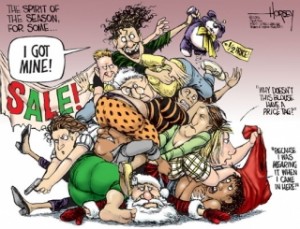Christmas: Capitalism At Its Best
Growing up, I remember Christmas being the most exciting time of the year. As I’ve gotten older and have become responsible for purchasing gifts for other people myself, I have come to associate the holiday with frenzy and anxiety. Thorstein Veblen was undoubtedly correct to refer to Christmas as a time of vicarious consumption. Christmas is literally referred to as “the season of giving” and if you are not giving you may be seen as cheap or a scrooge. As we have learned in our readings, one of parents’ biggest fears is having bored children. Parents also want to ensure their children do not feel left out or disappointed. With the growing emphasis on the importance of material items in the U.S., parents feel obligated to stretch their wallets at this time of year to ensure their children aren’t left out. This is because we have been socialized to believe that when you wake up on Christmas morning, there should be a towering mountain of gifts under the tree with your name on them. The main goal for many children is bragging rights. They want to be able to go to school the next day and compare who got the better presents.
“When compared to the average family budget, the Christmas gift budget makes up 1.3% of all average family spending. It is more than what the average family will spend on reading materials ($110/year) and alcoholic beverages ($435/year) put together.”
In the article “Modern Childhood, Modern Toys”, Gary Cross says, “But in the nineteenth century these celebrations of indulgence were increasingly focused on the family, in parents pampering children. The shower of gifts became a way of demonstrating personal affluence” (59). Essentially, families are going out of their way to buy their children’s happiness. The blame can in many instances be placed on advertising. Companies make it a point, especially at this time of year, to advertise their most expensive, sought after products while basically telling viewers how much they need it. Children see their friends playing with the best new toy and many advertisements lead them to feel like they aren’t “cool” if they don’t have that great toy too. Advertisements only solidify parents’ fear that they will disappoint their children.

